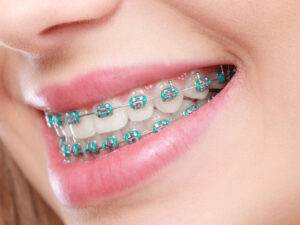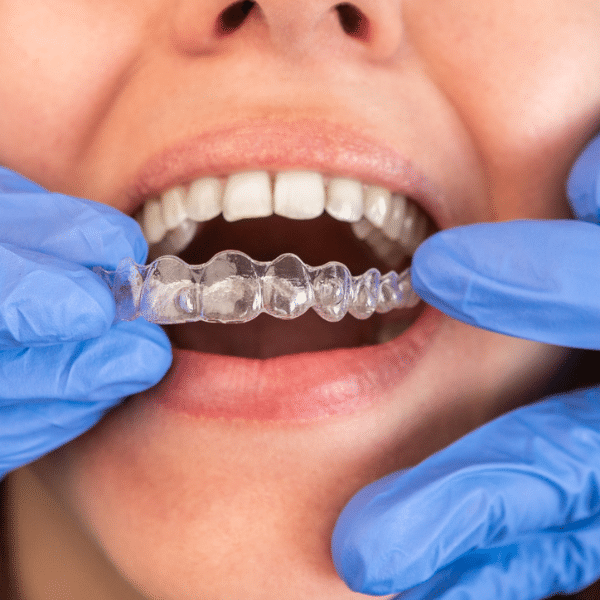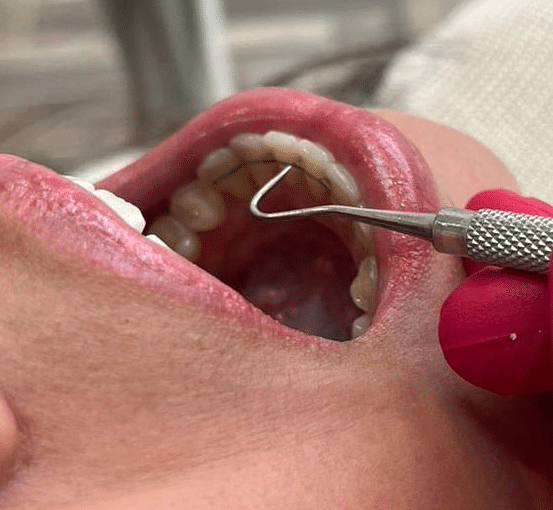
Introduction
Teeth feeling sore or extra sensitive during orthodontic treatment is normal for many patients. All types of orthodontic treatment (braces, Invisalign, retainers) can cause this feeling from time to time. In most cases, this is totally normal. Let’s take a look at why it happens, when to take action, and what you can do to feel more comfortable.
Are you in the New Haven/Shoreline area and have questions about sensitive teeth and Orthodontics?
A free consultation with Dobie Revolution Orthodontics is always available.
Sensitive Teeth and Orthodontic Treatment
Tooth sensitivity during orthodontic treatment is usually caused by one of a few things: the pressure of moving teeth, changes in bite alignment, or small habits such as grinding your teeth. Let’s break down what causes the sensitivity, how you know what’s normal, and when to get in touch with your orthodontist.
What Causes Sensitivity?
The most common cause of sensitivity is from the pressure created by the orthodontic appliances on your teeth that are moving them. However, other everyday habits and dental health issues can also contribute to sensitivity.
Common causes of sensitivity during orthodontic treatment:
- Pressure from braces or aligners shifting your teeth
- Exposed tooth roots or thinning enamel
- Gum recession
- Tooth grinding
- Eating or drinking very hot, cold, or sugary foods
- Cavities or early signs of decay around brackets or trays
- Inflammation of the gums
When Sensitivity Is Normal vs. When It’s a Red Flag
Slight sensitivity is completely normal for orthodontic patients, especially after an adjustment or switching to a new aligner. Sharp pain that doesn't improve could be a sign that something else is going on.
Normal sensitivity might feel like:
- Mild soreness for a few days after an adjustment or placement of new aligners
- Occasional zaps of pain when eating or drinking something cold
Red flags include:
- Sharp or shooting pain that lasts more than a few days
- Pain that is focused on one tooth or specific area for an extended period of time
- Sensitivity that gets worse over time

Spotting the Early Signs Your Kid Will Need Braces
For parents, early detection of orthodontic issues in your child’s oral health makes all the difference. At dobie revolution orthodontics, we highlight some of the key signs that your child may need braces
Braces and Tooth Sensitivity
Braces work by putting pressure on your teeth to guide them to the correct position. The pressure can make your teeth and gums feel tender after adjustments, but it should only last a few days before the pain subsides. Here’s what you can expect and how to handle it.

Why Braces Can Cause Soreness or Pain
When your braces are put on and adjusted, the pressure starts a process of moving your teeth through the bone. As the teeth move, cells in your gums remodel the surrounding bone which can cause micro-inflammation and soreness. Sharp pain is also possible if a wire or bracket is poking at your cheek or gums.
Tips for Reducing Sensitivity with Braces
If your braces are causing soreness, here are a few things that can help:
- Stick to soft foods for the first few days after adjustments
- Use orthodontic wax to cover any poking wires or brackets
- Rinse with warm salt water to soothe your gums
- Take over-the-counter pain relievers if your Orthodontist give you the okay
- Stay on top of brushing and flossing, even if it’s uncomfortable
When to Contact Your Orthodontist About Pain
Call your Orthodontist if:
- The pain is sharp and doesn’t go away after a few days
- Something feels loose, bent, or broken
- You see swelling, bleeding, or signs of infection around a tooth or gums
Invisalign and Tooth Sensitivity
While Invisalign and other aligners are known for being more comfortable than braces, they can still make you feel some sort of soreness. Your teeth still move, and sensitivity can still happen.

How Aligner Pressure Affects Your Teeth
Every time you switch to a new set of trays, your teeth have to adjust to a new position. That pressure, similarly to braces, can make your teeth feel sensitive for the first day or two, especially when eating or drinking something cold.
Managing Discomfort During Aligner Transitions
Here are a few ways to ease discomfort when dealing with sensitivity from aligners:
- Switch to new aligners at night so you sleep through the worst of it
- Stick with softer foods for the first day or so
- Keep aligners in as much as possible, taking them in and out can make sensitivity worse
- Talk to your orthodontist if your feel pain that doesn’t go away
Retainers and Tooth Sensitivity
Sensitivity may occur when you begin wearing your retainer, even after active treatment, and particularly if you haven't worn it recently. Let's see what’s typical and what could indicate a different issue.

Temporary Discomfort After Retainer Wear
Your teeth may have moved a little if your retainer feels tight or causes discomfort. After a few hours or a day or two of regular wear, this type of soreness usually goes away.
Cleaning and Fit Issues That Might Cause Pain
Sensitivity can occasionally be caused by the retainer rather than the teeth. It may cause uneven pressure on some teeth or irritate your gums if it's dirty, cracked, or not fitted properly. Make sure your retainer fits comfortably, not too tight, and is always clean.
try the dobie revolution video game!

At-Home Remedies and Pain Management Tips
With a few simple adjustments to your daily routine, mild sensitivity can usually be controlled at home. Always consult your orthodontist if pain persists for more than a few days or worsens.
Toothpaste for Sensitive Teeth
The signals that cause pain can be blocked by using toothpaste made for sensitive teeth. Try to stay away from whitening toothpastes, which can exacerbate sensitivity, and choose fluoride-based products with ingredients like potassium nitrate.
Dietary Adjustments That Can Help
What you eat and drink can make a big difference in your sensitivity.
- Avoid icy drinks or hot soups during sensitive periods
- Cut back on sugary or acidic foods that can irritate your enamel
- Stick to softer foods after adjustments or tray changes
When Sensitivity Signals a Bigger Problem, Talk to Dobie Revolution
Now that you know tooth sensitivity during orthodontic treatment is common, you probably don’t have anything to worry about (other than making it through the few days of discomfort after adjustments!). But, if something doesn’t feel right, or the pain sticks around, you don’t need to try and tough it out. We’re here to make sure your treatment is smooth, safe, and as comfortable as possible. If you’re unsure about a feeling you have, reach out to our team at dobie revolution orthodontics. We’re happy to help!













